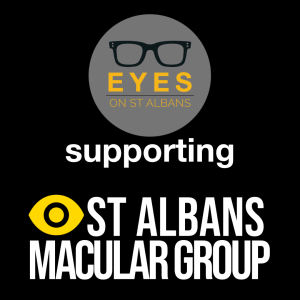Macular Disease affects nearly 1.5 million people in the UK. Age-related macular degeneration (AMD) is the most common condition, generally affecting people over the age of 55 and affecting more than 700,000 people here in the UK.
As you may have seen in recent press coverage, Dame Judi Dench has spoken openly about having AMD and the difficulties she is now facing having relied so much on her photographic memory until now. She is now having to find new ways to get around film sets and to learn her lines – not just what she has to say but where those lines come in the dialogue.
OK, so what’s the macula?
The macula is part of the retina at the back of the eye. It is only about 5mm across, but is responsible for our central vision, most of our colour vision and the fine detail of what we see.
The macula has a very high concentration of the cells that detect light. They send signals to the brain, which interprets them as images. The rest of the retina processes our peripheral, or side vision.
What causes macular degeneration?
Macular degeneration can be caused by a variety of conditions. The Macular Society list 21 types which can affect people of all ages. Some are genetic whilst others are related to comorbid conditions like diabetes and high blood pressure.
With AMD, about 1 in 200 people have it by the age of 60. By the age of 90 it affects 1 in 5. Because we’re living longer, the number of people affected is increasing, and because women live longer than men, they are more likely to be affected.
What happens with AMD
As we get older, the macula can start to degenerate – both through retinal cells dying off and not being replaced by the body (dry age-related macular degeneration) or by abnormal blood vessel growth in the eyes which then leak and cause scarring (wet age-related macular degeneration).
Many people with AMD have one eye with dry AMD and the other with wet.
Regular eye tests (yes, we’re dropping that hint again) are key to early diagnosis, ensuring that you have the retinal photography we offer as standard here at EYES on St Albans.
If we do detect early AMD there are a number of things you can do to reduce the likelihood of the disease progressing:
- If you smoke, stop. Smoking kills the cells of the retina and can cause AMD to progress faster. If you smoke, you’re 4 times more likely to develop AMD
- Take moderate exercise to help keep your blood pressure under control
- Eat a healthy diet with plenty of leafy greens to keep your eyes healthy
Get support
We were delighted to discover that St Albans has its own Macular Group which meets monthly at Homewood Road URC. They welcome new members and offer a varied programme which always includes tea & coffee!
All presenters are amplified (with a hearing loop available), there is disabled access and plenty of parking. Drivers are welcome to stay for the meeting and transport can be arranged.
You can find out more at: https://stalbansmaculargroup.org
If you have any questions about any form of macular issues, especially if they run in the family, please do book an appointment with us. We’re always happy to explain things in more detail and make sure we’re doing everything we can to keep your eyes healthy.



 EYES on Community
EYES on Community
Leave a Reply